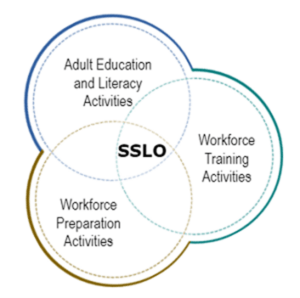Career Pathways
“Come train for the job of your dreams. If you don’t have your high school diploma, don’t worry. We can help with that along the way.”

Career Pathways are present through all areas of community colleges. Students can enter or exit a pathway at any time, beginning at the point most appropriate for them based on their educational background and continuing as far as they’d like to go. According to the federal definition used across all departments in North Carolina’s community colleges, a career pathway is, “a combination of rigorous and high-quality education, training and other services that –
- Aligns with the skill needs of industries in the economy of the State or regional economy involved;
- Prepares an individual to be successful in any of a full range of secondary or postsecondary education options, including apprenticeships;
- Includes counseling to support an individual in achieving the individual’s education and career goals;
- Includes, as appropriate, education offered concurrently and in the same context as workforce preparation activities and training for a specific occupation or occupational cluster;
- Organizes education, training and other services to meet the particular needs of an individual in a manner that accelerates the educational and career advancement of the individual to the extent practicable;
- Enables an individual to obtain a secondary school diploma or its recognized equivalent, and at least 1 recognized postsecondary credential;
- Helps an individual enter or advance within a specific occupation or occupational cluster.
In North Carolina, there are 16 identified career clusters. A career pathway typically follows a student through a career cluster, earning stackable credentials, certificates, degrees and diplomas. Students may be enrolled in several departments at a community college as they travel a career pathway, including College and Career Promise (CCP) through their high school, College and Career Readiness, Continuing Education and Workforce Training, Curriculum and more. Cross departmental collaboration is an integral part of a successful career pathway for our students.
Integrated Education and Training (IET)
 For many students in the College and Career Readiness program, the first point on their career pathway is an Integrated Education and Training (IET) program. An IET is “a service approach that provides adult education and literacy activities concurrently and contextually with workforce preparation activities and workforce training for a specific occupation or occupational cluster for the purpose of educational and career advancement.” IETs have a single set of learning objectives (SSLO) shared by the different activities, so students should experience the IET as a cohesive program.
For many students in the College and Career Readiness program, the first point on their career pathway is an Integrated Education and Training (IET) program. An IET is “a service approach that provides adult education and literacy activities concurrently and contextually with workforce preparation activities and workforce training for a specific occupation or occupational cluster for the purpose of educational and career advancement.” IETs have a single set of learning objectives (SSLO) shared by the different activities, so students should experience the IET as a cohesive program.
IETs accelerate student progress and also provide opportunities for CCR programs. Programs can document Measurable Skills Gains (MSG) for students earning industry recognized credentials while concurrently enrolled in adult education. Please refer to the State of NC Policy and Guidance on Measurable Skills Gains for more information.
LINCS offers an excellent ADVANCE IET: IET Fundamentals course to help get you started. To access more of our statewide resources and to submit an IET template for state approval, please visit our Career Pathways Moodle site.
Workplace Literacy
Workplace literacy falls under the IET umbrella because it offers the opportunity to earn MSG 4. Workplace literacy programs are offered in collaboration with an employer and must take place at a workplace or offsite location. Together with the employer, the Title II provider sets goals for the participants with milestones along the way for which MSG 4 may be earned. As a result of the instruction, employees must be eligible for a pay raise or promotion. An IET template must be submitted and approved in order to capture MSG 4 for a workplace literacy program.
For related content about Career Pathways for specific populations, visit:
www.nctitle2.org/ielce
www.nctitle2.org/corrections


